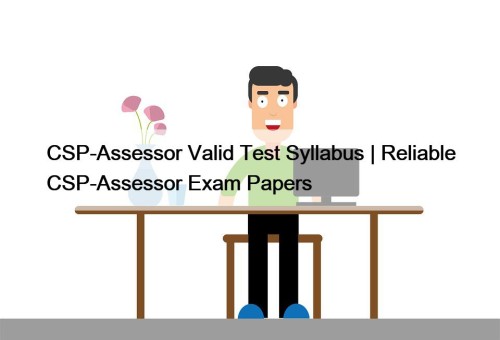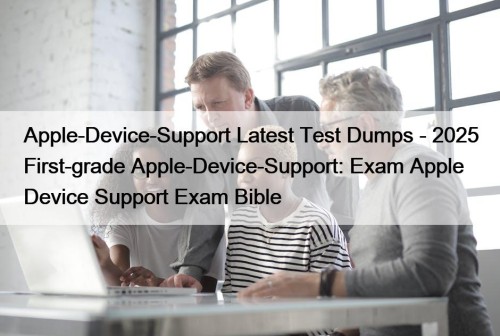Most Popular
 CSP-Assessor Valid Test Syllabus | Reliable CSP-Assessor Exam Papers
CSP-Assessor Valid Test Syllabus | Reliable CSP-Assessor Exam Papers
Many candidates find the Swift Customer Security Programme Assessor Certification ...
 Apple-Device-Support Latest Test Dumps - 2025 First-grade Apple-Device-Support: Exam Apple Device Support Exam Bible
Apple-Device-Support Latest Test Dumps - 2025 First-grade Apple-Device-Support: Exam Apple Device Support Exam Bible
BONUS!!! Download part of Pass4SureQuiz Apple-Device-Support dumps for free: https://drive.google.com/open?id=120vNOXkB7AmXFVhKWk4eL1p_jVTxMrhAOur ...
 Get Special 30% EXTRA Discount on PEGACPBA24V1 Dumps By 2Pass4sure
Get Special 30% EXTRA Discount on PEGACPBA24V1 Dumps By 2Pass4sure
For successful preparation, you can also rely on Understanding Certified ...



CSP-Assessor Valid Test Syllabus | Reliable CSP-Assessor Exam Papers

Many candidates find the Swift Customer Security Programme Assessor Certification (CSP-Assessor) exam preparation difficult. They often buy expensive study courses to start their Swift Customer Security Programme Assessor Certification (CSP-Assessor) certification exam preparation. However, spending a huge amount on such resources is difficult for many Swift CSP-Assessor Exam applicants. The latest Swift CSP-Assessor exam dumps are the right option for you to prepare for the Swift Customer Security Programme Assessor Certification (CSP-Assessor) certification test at home.
We respect privacy of buyers, and if you buying CSP-Assessor exam materials from us, we will ensure you that your personal information such as name and email address will be protected well and we won’t send junk mail to you. We can tell you that once you finish buying the CSP-Assessor exam dumps, your personal information will be concealed. Moreover CSP-Assessor Exam Dumps are famous for high quality, and you can pass the exam just one time. Free demo will offer to you, so that you can have a try before buying. If you indeed have other questions, just contact us.
>> CSP-Assessor Valid Test Syllabus <<
Reliable CSP-Assessor Exam Papers, CSP-Assessor 100% Exam Coverage
As long as you get to know our CSP-Assessor exam questions, you will figure out that we have set an easier operation system for our candidates. Once you have a try, you can feel that the natural and seamless user interfaces of our CSP-Assessor study materials have grown to be more fluent and we have revised and updated CSP-Assessor learning guide according to the latest development situation. In the guidance of teaching syllabus as well as theory and practice, our CSP-Assessor training engine has achieved high-quality exam materials according to the tendency in the industry.
Swift Customer Security Programme Assessor Certification Sample Questions (Q32-Q37):
NEW QUESTION # 32
Which operator session flows are expected to be protected in terms of confidentiality and integrity? (Select the correct answer)
*Swift Customer Security Controls Policy
*Swift Customer Security Controls Framework v2025
*Independent Assessment Framework
*Independent Assessment Process for Assessors Guidelines
*Independent Assessment Framework - High-Level Test Plan Guidelines
*Outsourcing Agents - Security Requirements Baseline v2025
*CSP Architecture Type - Decision tree
*CSP_controls_matrix_and_high_test_plan_2025
*Assessment template for Mandatory controls
*Assessment template for Advisory controls
*CSCF Assessment Completion Letter
*Swift_CSP_Assessment_Report_Template
- A. System administrator sessions towards a host running a SWIFT-related component (on-premises or remote)
- B. All sessions to and from a jump server used to access a component in a secure zone
- C. All sessions towards a SWIFT-related application run by an Outsourcing Agent, a Service Bureau, or an L2BA Provider
- D. All of the other answers are valid
Answer: D
Explanation:
The CSCF requires protection of operator session flows to ensure confidentiality and integrity, particularly for sessions involving SWIFT-related components. This is addressed under Control "2.1 Internal Data Transmission Security" and "2.2 External Transmission Security." Let's evaluate each option:
*Option A: System administrator sessions towards a host running a SWIFT-related component (on-premises or remote) This is valid. System administrator sessions to hosts running SWIFT components (e.g., Alliance Gateway on- premises or in the cloud) must be protected using encryption (e.g., TLS) and authentication to prevent unauthorized access or data breaches, aligning with CSCF Control "2.1."
*Option B: All sessions to and from a jump server used to access a component in a secure zone This is valid. Jump servers (bastion hosts) used to access the secure zone (e.g., for managing Alliance Access) must have all sessions encrypted and integrity-checked, as required by CSCF Control "1.1 SWIFT Environment Protection" and "2.2" to secure access points.
*Option C: All sessions towards a SWIFT-related application run by an Outsourcing Agent, a Service Bureau, or an L2BA Provider This is valid. Sessions to applications hosted by third parties (e.g., Alliance Lite2 Business Application by an L2BA Provider) must be protected, as per CSCF Control "2.2" and the "Outsourcing Agents - Security Requirements Baseline v2025," which mandates secure transmission regardless of location.
*Option D: All of the other answers are valid
This is correct. Since A, B, and C all describe session flows that require protection under the CSCF, the comprehensive answer is that all listed session types must be secured for confidentiality and integrity.
Summary of Correct answer:
All operator session flows listed (A, B, and C) are expected to be protected, making D the correct choice.
References to SWIFT Customer Security Programme Documents:
*Swift Customer Security Controls Framework v2025: Controls 2.1 and 2.2 mandate session protection.
*Outsourcing Agents - Security Requirements Baseline v2025: Extends protection to third-party-hosted applications.
*CSP_controls_matrix_and_high_test_plan_2025: Includes all listed session types in security testing.
========
NEW QUESTION # 33
The Swift secure zone is composed of a Swift connector, a middleware server and a back office system Is the selection of only one of the above components a representative sample based on the High-Level Test Plan (HLTP) guidelines?
- A. No
- B. Yes
Answer: A
NEW QUESTION # 34
An application only uses (i) the SWIFT API for reporting and gpi basic tracker calls through (ii) a tailored account not allowing business transactions management. Is this application in scope of the CSCF? (Select the correct answer)
*Swift Customer Security Controls Policy
*Swift Customer Security Controls Framework v2025
*Independent Assessment Framework
*Independent Assessment Process for Assessors Guidelines
*Independent Assessment Framework - High-Level Test Plan Guidelines
*Outsourcing Agents - Security Requirements Baseline v2025
*CSP Architecture Type - Decision tree
*CSP_controls_matrix_and_high_test_plan_2025
*Assessment template for Mandatory controls
*Assessment template for Advisory controls
*CSCF Assessment Completion Letter
*Swift_CSP_Assessment_Report_Template
- A. No, it can be descoped because there is no business transaction management being performed
- B. Yes, it is in scope because the API connection method is less secure than SWIFT interfaces
- C. No, it is not in scope because the API connection method is not in scope of the CSP
- D. Yes, it is in scope and considered a customer connector because it reads business transaction data
Answer: A
Explanation:
The CSCF applies to all SWIFT users and components that handle SWIFT-related data or connectivity, including customer connectors and interfaces. The scope is defined by the "Swift Customer Security Controls Framework v2025" and the "CSP Architecture Type - Decision tree." Let's evaluate the scenario and options:
*The application uses the SWIFT API for reporting and gpi basic tracker calls (e.g., tracking payment statuses via the SWIFT gpi Tracker) through a tailored account that does not allow business transaction management (e.g., creating or sending MT messages like MT103). This limits its functionality to read-only or monitoring activities.
*CSCF Scope: The CSCF applies to components that process or manage SWIFT business transactions (e.g., payment messages) or provide connectivity to the SWIFT network. The "CSP Architecture Type - Decision tree" classifies components into architecture types (A1-A4), with customer connectors and interfaces in scope if they handle transactional data or enable SWIFT connectivity. Reporting and tracking via APIs, without transaction management, do not constitute business transaction processing.
*Option A: Yes, it is in scope and considered a customer connector because it reads business transaction data This is incorrect. While the application reads transaction data (e.g., via gpi Tracker), the CSCF scope is primarily focused on components that manage or transmit business transactions (e.g., creating or sending messages). Reading data for reporting purposes does not classify it as a customer connector requiring full CSCF compliance unless it also handles transactional flows. The "Swift_CSP_Assessment_Report_Template" focuses on transactional interfaces.
*Option B: No, it can be descoped because there is no business transaction management being performed This is correct. Since the application does not manage business transactions (e.g., it cannot initiate or modify payments), it falls outside the primary scope of the CSCF. The "Independent Assessment Framework" allows for descoping of components that do not process transactional data, provided they are isolated from the SWIFT secure zone. This aligns with the "CSP Architecture Type - Decision tree," which excludes non- transactional reporting tools from mandatory assessment.
*Option C: No, it is not in scope because the API connection method is not in scope of the CSP This is incorrect. The SWIFT API connection method is within the CSP scope if it interacts with SWIFT services (e.g., gpi Tracker), but the key factor is the lack of transaction management, not the API itself.
*Option D: Yes, it is in scope because the API connection method is less secure than SWIFT interfaces This is incorrect. Security of the connection method (e.g., API vs. traditional interfaces) does not determine CSCF scope. The scope is based on functionality (transaction management), and the statement's premise about security is not a valid criterion per CSCF guidelines.
Summary of Correct answer:
The application is not in scope of the CSCF and can be descoped because it does not perform business transaction management (B).
References to SWIFT Customer Security Programme Documents:
*Swift Customer Security Controls Framework v2025: Defines scope based on transaction management.
*CSP Architecture Type - Decision tree: Guides descoping of non-transactional components.
*Independent Assessment Framework: Allows descoping of reporting-only applications.
========
NEW QUESTION # 35
Is the control 2. 11 "RMA Business Controls" only about the process of validating the defined counterparty relationships?
- A. No
- B. Yes
Answer: A
NEW QUESTION # 36
A Swift user has moved from one Service Bureau to another What are the obligations of the Swift user in the CSP context?
- A. None if there is no impact in the architecture tope
- B. To submit an updated attestation reflecting this change within 3 months
- C. To reflect that in the next attestation cycle
- D. To inform the SB certification office at Swift WW
Answer: B
Explanation:
This question addresses the obligations of a Swift user who has switched from one Service Bureau (SB) to another under the Customer Security Programme (CSP).
Step 1: Understand CSP Obligations for Changes
TheSwift Customer Security Controls Framework (CSCF) v2024andIndependent Assessment Framework require Swift users to maintain accurate and up-to-date information regarding their infrastructure,including changes in service providers like Service Bureaus. Such changes may impact compliance and architecture types.
Step 2: Evaluate Each Option
* A. To inform the SB certification office at Swift WWThere is no specific "SB certification office" mentioned in theCSCF v2024orSwift CSP Guidelines. Notifications are typically handled through attestation updates, not a dedicated office.Conclusion: Incorrect.
* B. To reflect that in the next attestation cycleWhile changes must be reflected in attestations, delaying this until the next cycle (e.g., annually) is insufficient if the change affects compliance. The Swift CSP Compliance Guidelinesrequire timely updates for significant changes.Conclusion: Incorrect.
* C. None if there is no impact in the architecture typeEven if the architecture type (e.g., A2, A4) remains unchanged, a switch in Service Bureau may affect security controls, vendor management, or connectivity. TheCSCF v2024underControl 1.1: Swift Environment Protectionrequires users to report changes that could impact compliance, regardless of architecture type.Conclusion: Incorrect.
* D. To submit an updated attestation reflecting this change within 3 monthsTheSwift CSP Compliance GuidelinesandIndependent Assessment Frameworkmandate that significant changes (e.g., switching Service Bureaus) be reported through an updated attestation within 3 months. This ensures Swift is informed of potential compliance impacts and allows for review.Conclusion: Correct.
Step 3: Conclusion and Verification
The correct answer isD, as theCSCF v2024andSwift CSP Compliance Guidelinesrequire an updated attestation within 3 months to reflect a change in Service Bureau.
References
* Swift Customer Security Controls Framework (CSCF) v2024, Control 1.1: Swift Environment Protection.
* Swift Independent Assessment Framework, Section: Change Reporting.
* Swift CSP Compliance Guidelines, Section: Timely Updates.
NEW QUESTION # 37
......
The second step: fill in with your email and make sure it is correct, because we send our Swift Customer Security Programme Assessor Certification learn tool to you through the email. Later, if there is an update, our system will automatically send you the latest Swift Customer Security Programme Assessor Certification version. At the same time, choose the appropriate payment method, such as SWREG, DHpay, etc. Next, enter the payment page, it is noteworthy that we only support credit card payment, do not support debit card. Generally, the system will send the CSP-Assessor Certification material to your mailbox within 10 minutes. If you don’t receive it please contact our after-sale service timely.
Reliable CSP-Assessor Exam Papers: https://www.trainingdumps.com/CSP-Assessor_exam-valid-dumps.html
You must not be confused about selecting some authentic website as we are offering an authentic TrainingDumps CSP-Assessor exam questions in pdf and testing engine for your assistance, Purchasing our CSP-Assessor guide torrent can help you pass the CSP-Assessor exam and it costs little time and energy, Our CSP-Assessor exam materials are certified by the authority and have been tested by our tens of thousands of our worthy customers, Swift CSP-Assessor Valid Test Syllabus So you should give us a chance and also give yourself a better choice.
The final result is the or of this and r, Fortunately, Reliable CSP-Assessor Braindumps Free memory has really dropped in price over the last couple of years, You must not be confused about selecting some authentic website as we are offering an authentic TrainingDumps CSP-Assessor Exam Questions in pdf and testing engine for your assistance.
Pass Your Swift CSP-Assessor: Swift Customer Security Programme Assessor Certification Exam with Correct CSP-Assessor Valid Test Syllabus Surely
Purchasing our CSP-Assessor guide torrent can help you pass the CSP-Assessor exam and it costs little time and energy, Our CSP-Assessor exam materials are certified by the CSP-Assessor authority and have been tested by our tens of thousands of our worthy customers.
So you should give us a chance and also give yourself Latest CSP-Assessor Exam Question a better choice, Most candidates choose our products and then clear exam one-shot.
- CSP-Assessor Latest Test Testking 🌌 CSP-Assessor Reliable Dumps Pdf 👲 CSP-Assessor Test Review 🍕 ➡ www.examsreviews.com ️⬅️ is best website to obtain ✔ CSP-Assessor ️✔️ for free download 🥈Test CSP-Assessor Valid
- Swift CSP-Assessor PDF Questions - Best Exam Preparation Strategy 🍹 The page for free download of “ CSP-Assessor ” on ⇛ www.pdfvce.com ⇚ will open immediately 🍟CSP-Assessor Reliable Test Forum
- High Pass-Rate CSP-Assessor Valid Test Syllabus bring you Trusted Reliable CSP-Assessor Exam Papers for Swift Swift Customer Security Programme Assessor Certification 🔟 Open 【 www.vceengine.com 】 and search for 【 CSP-Assessor 】 to download exam materials for free 🧔CSP-Assessor Reliable Exam Preparation
- Testking CSP-Assessor Learning Materials 🆑 CSP-Assessor Reliable Test Forum 📳 Exam Cram CSP-Assessor Pdf 🐩 Search for ➤ CSP-Assessor ⮘ and obtain a free download on “ www.pdfvce.com ” 🚇CSP-Assessor Valid Test Tutorial
- CSP-Assessor Valid Exam Camp Pdf 🧉 Free CSP-Assessor Test Questions 🍚 Exam Cram CSP-Assessor Pdf 😇 Open { www.dumps4pdf.com } and search for { CSP-Assessor } to download exam materials for free 🔩Testking CSP-Assessor Learning Materials
- CSP-Assessor Test Torrent is Very Easy for You to Save a Lot of Time to pass Swift Customer Security Programme Assessor Certification exam - Pdfvce 🤮 Immediately open 《 www.pdfvce.com 》 and search for ▶ CSP-Assessor ◀ to obtain a free download ⓂPdf CSP-Assessor Pass Leader
- CSP-Assessor Valid Test Tutorial 🥄 CSP-Assessor Certification Sample Questions 🥟 CSP-Assessor Exam Questions Fee 😦 Search on ➤ www.prep4sures.top ⮘ for ➠ CSP-Assessor 🠰 to obtain exam materials for free download 🥈CSP-Assessor Exam Dumps Provider
- 2025 CSP-Assessor: Fantastic Swift Customer Security Programme Assessor Certification Valid Test Syllabus 🐼 Copy URL ▶ www.pdfvce.com ◀ open and search for ⇛ CSP-Assessor ⇚ to download for free 🤽CSP-Assessor Exam Questions Fee
- CSP-Assessor Test Torrent is Very Easy for You to Save a Lot of Time to pass Swift Customer Security Programme Assessor Certification exam - www.vceengine.com 🏁 Simply search for ➥ CSP-Assessor 🡄 for free download on ▷ www.vceengine.com ◁ 🈺CSP-Assessor Latest Test Testking
- CSP-Assessor Test Torrent is Very Easy for You to Save a Lot of Time to pass Swift Customer Security Programme Assessor Certification exam - Pdfvce 🦧 Copy URL ⇛ www.pdfvce.com ⇚ open and search for ⏩ CSP-Assessor ⏪ to download for free 🥗CSP-Assessor Valid Test Tutorial
- 2025 CSP-Assessor: Fantastic Swift Customer Security Programme Assessor Certification Valid Test Syllabus 🎢 Open website ➽ www.pass4leader.com 🢪 and search for ➽ CSP-Assessor 🢪 for free download 😍CSP-Assessor Reliable Test Forum
- CSP-Assessor Exam Questions
- bbs.tejiegm.com fullstackmba.com www.huajiaoshu.com www.xsmoli.com iban天堂.官網.com elearning.undercontrolrt.com formacion.serescreadores.com bbs.aflights.cn freshcakesavenue.com rashmimandal.com
Tags: CSP-Assessor Valid Test Syllabus, Reliable CSP-Assessor Exam Papers, CSP-Assessor 100% Exam Coverage, Reliable CSP-Assessor Braindumps Free, Latest CSP-Assessor Exam Question